A bid by Georgetown University students to pay reparations to the descendants of slaves sold by their institution is threatening hard ethical assessments across much of US higher education, according to some experts.
The students’ proposal instead would create a new $27.20 (£20.83) per-semester student fee to benefit thousands of descendants of the 272 slaves who were sold in 1838 – for about $3.3 million in today’s monetary value – to save Georgetown from a financial crisis.
Georgetown’s leadership appears unsure how to proceed. The president of the nation’s oldest Catholic and Jesuit university, John J. DeGioia, issued a 700-word response promising to take the student request “very seriously” while outlining a long process of evaluation.
The 11 April undergraduate referendum attracted a record 57 per cent turnout, with 66 per cent endorsing the new fee, said Richard J. Cellini, a Georgetown alumnus who led efforts to identify the 272 slaves and nearly 8,300 of their direct descendants.
Yet, said Mr Cellini, the chief executive officer of Briefcase Analytics, Dr DeGioia appears to be warning that Georgetown’s governing board of directors might never even consider the idea.
Georgetown “definitively owes its continued existence to the sale of enslaved human beings”, said Edward E. Baptist, a Georgetown alumnus and professor of history at Cornell University. His book, The Half Has Never Been Told, describes the profitability and cruelty of slavery as booming in the early 1800s when Southern cotton farming exploded just as slave imports from Africa were banned.
The resulting massive economic boost was central to the US’ emergence as a world power, he explained.
Virtually all progress in convincing US universities to own up to their slavery-related responsibilities is attributable to student activism, said Ana Lucia Araujo, a professor of history at Howard University.
Dr Baptist said that he is proud of the Georgetown student vote, but does not feel that students should bear the primary cost. “Certainly the institution itself owes a much bigger debt than any of those individual students,” he said.
As a next step, said William A. Darity, a professor of public policy at Duke University, the students might consider pushing Georgetown to lead a group of colleges in pushing Congress for a much broader set of reparations for black Americans.
Far beyond the period of slavery, Dr Darity said, societal debts to black Americans continue to accrue in such forms as “persistent labour market discrimination and the appalling racial wealth gap”.
Georgetown – with limited actions to date that include admitting as students a handful of descendants of the 272 slaves – is still moving faster than many other US universities that directly benefited from slavery.
Colleges throughout the Eastern US, said Davarian L. Baldwin, a professor of American studies at Trinity College in Hartford, “were literally built by the slave economic system – both North and South”.
One of the worst cases of avoidance, Dr Baptist said, may be the University of Georgia, which battled students and alumni seeking recognition for about 100 slaves found buried beneath a campus building under renovation in 2015.
Such denials by US universities of the negative effects of their operations go well into the present day, said Marcia Chatelain, an associate professor of history and African American studies at Georgetown. They include campuses expanding into communities in ways that force out local residents, she said.
As with almost all US property owners, US colleges could see their moral accountability extend into their use of indigenous lands, Dr Baldwin said. Many institutions avoid acknowledgements concerning black or native populations, he said, “because of the fear that it will be followed by stronger economic demands for reparations”.
Register to continue
Why register?
- Registration is free and only takes a moment
- Once registered, you can read 3 articles a month
- Sign up for our newsletter
Subscribe
Or subscribe for unlimited access to:
- Unlimited access to news, views, insights & reviews
- Digital editions
- Digital access to THE’s university and college rankings analysis
Already registered or a current subscriber?








